Is Cheating on an Exam a Sin? A Moral and Ethical Examination
Cheating on an exam is a complex issue that transcends simple right and wrong. While many would immediately deem it wrong, the question of whether it's a sin depends heavily on individual religious beliefs and moral frameworks. This article will explore the ethical and religious perspectives on academic dishonesty, addressing common questions and concerns.
What constitutes cheating on an exam?
Before diving into the morality of cheating, it's crucial to define the act itself. Cheating encompasses a broad range of behaviors, including:
- Copying answers from another student. This is the most straightforward form of cheating and is universally condemned.
- Using unauthorized materials. This includes notes, textbooks, or electronic devices during an exam unless explicitly permitted.
- Collaborating with others during an exam. This violates the expectation of individual work and undermines the assessment's purpose.
- Plagiarism. Presenting someone else's work as your own, whether from a written source or code, is a serious form of academic dishonesty.
- Impersonation. Having someone else take an exam on your behalf.
Is cheating on an exam a sin from a religious perspective?
The answer to this question depends on your faith. Most major religions emphasize honesty and integrity. Cheating violates these principles by:
- Dishonesty: Deceiving instructors and institutions about one's knowledge and abilities.
- Lack of Integrity: Compromising one's personal values and betraying trust.
- Violation of ethical codes: Many professions have strict ethical codes that prohibit dishonesty, and academic integrity is often seen as a foundation for professional ethics.
Many religions condemn dishonesty as a sin. For instance, in Christianity, the Ten Commandments include "Thou shalt not bear false witness," which can be interpreted to encompass cheating. Similar principles of honesty and integrity are found in Islam, Judaism, and other faiths.
Frequently Asked Questions
1. What are the consequences of cheating on an exam?
The consequences of cheating can be severe, ranging from failing the exam or course to suspension or expulsion from the institution. It can also damage one's reputation and future academic and professional opportunities.
2. Is it a sin to cheat if I'm under immense pressure?
While pressure may be a contributing factor, it does not excuse the act of cheating. The pressure to succeed should motivate seeking help and support, not resorting to dishonesty.
3. Is it cheating if I accidentally look at someone else's paper?
Accidental glances are different from intentional copying. However, it's crucial to maintain awareness and avoid any situation that might lead to temptation.
4. Is it a sin if I only cheat a little?
Even minor instances of cheating violate ethical principles and undermine academic integrity. The severity of the sin is not necessarily tied to the scale of the act, but rather the intentional violation of trust and honesty.
5. How can I avoid cheating on an exam?
Proper preparation is key. This includes effective study strategies, seeking help when needed, understanding the material thoroughly, and managing stress levels effectively.
Conclusion:
Whether cheating on an exam is considered a sin depends on individual religious beliefs and moral compass. However, from an ethical perspective, it's unequivocally wrong. It undermines the purpose of education, violates principles of honesty and integrity, and can have serious consequences. The best approach is to prioritize ethical behavior and academic integrity, even when faced with pressure. Remember, true success comes from hard work and honest effort.
